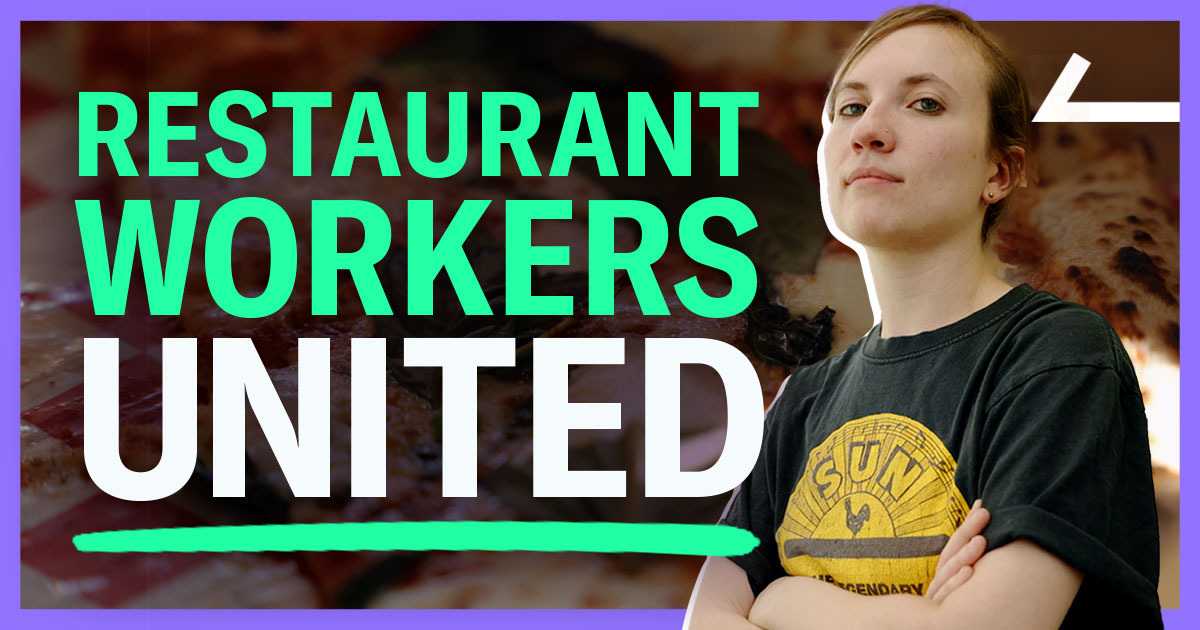Produced and edited by Paula Pecorella and Meg Hershclein
Restaurant workers in Austin are launching an ambitious effort to unionize the entire restaurant industry. Workers at the pizza chain Via 313 face rampant wage theft, 100+ kitchen temperatures, and no sick pay. They’re forming the independent union Restaurant Workers United to fight back. We spoke with the Austin-based workers. Below is a full transcript of the video.
Ben Mulick: It’s very easy to organize your workplace when all of you are being mistreated.
Henry Epperson: If Via [313] could charge $30 for a pizza, they could pay their workers a livable wage.
Leah Meltzer: Via 313 is a pizza restaurant that started in Austin, Texas. It is Detroit-style pizza.
Henry: It is now a chain, basically, because it was bought out by this restaurant fund, Savory.
Leah: It’s a private equity firm.
John Cuvillier: And their plan is to expand rapidly within the next five years to open 50 stores across the United States, and then sell it. And during this process they do not know how to run a restaurant, they don’t know how to take care of their employees, they’re not here on the ground with us—they’re based in Utah. So the only time they do come out here is on their private jets to come and cut costs.
Henry: So a lot of people have gotten their wages stolen from them, essentially. Like, they’ll check their paystubs after a check and then the hours are missing, and there’s pay missing.
Ben: There have been promises of back pay to various workers and these promises have never been fulfilled
John: One co-worker named Joe quit after the company failed to give him $400 in missed wages, and a $500 sign-on bonus, so he was owed $900.
Ben: We don’t get paid well. It took months for me to beg for a raise.
Henry: $2.13 an hour plus tips, like, that’s crazy. You know, they’re outsourcing our wages to customers and if they don’t like you they don’t have to pay you. And I think that’s just ridiculous. Because if Via could charge $30 for a pizza, they can pay their workers a livable wage.
John: When I started there, there wasn’t any AC in the building, there hadn’t been AC for a while. It got up to 107 degrees and I had a 550 degree oven blasting heat behind me.
Ben: We’re talking about Texas in the summer without a properly functioning AC.
Henry: When it breaks it usually takes them a month or two months to fix it, and it just makes working in that environment almost unbearable.
Ben: There were a ton of people getting COVID because they were working at Via. I got COVID because I was working at Via.
Henry: While we were out sick, one of the higher up managers was texting us and trying to check in with us and ask us what we needed. A lot of us said sick pay, I was one of those people, and she said, “We can’t really do that.” We tried to have meetings with them, they would dodge us. So eventually we were like, you know what, we’re gonna turn a petition in. And they suspended a majority of the people that turned it in. The minute they did that we showed them how strong we were and we organized.
Organized that protest. We had about 150-200 people turn out for that. After that, they gave everybody back pay that was suspended, and they gave them their jobs back
John: It should be the workers organizing and it should be the workers making the decisions about what they want and how they want to fight for it. And so the reason why we filed independently and started Restaurant Workers United is to be a resource for those who want to organize restaurants.
Leah: Overall, I don’t think that Via is unique in the kinds of issues that we experience at work. I think everything that we see, like wage theft, hours being cut, people not getting the hours they need, no sick pay, no paid vacation, dangerous working conditions—I think all of these things are things that are super, super common in the service industry.
We can’t go find another job in the service industry that’s gonna be significantly better, or we’re gonna feel significantly more taken care of, or cared about, or valued. That’s why we’re organizing. It’s because we want to change the industry and not just because we need a change so desperately at Via.
Henry: I wanna spark change in this industry. My best case scenario is that it starts here at Via, it starts here in Austin, but it expands all over the place. I want service workers around the world to unite and fight back and fight back for their rights.
Videography by Amir Rofoogar



